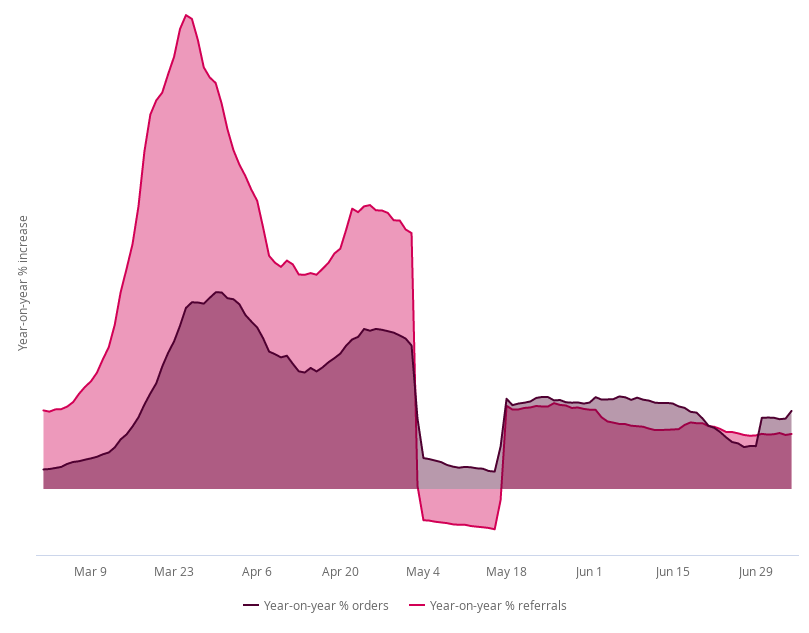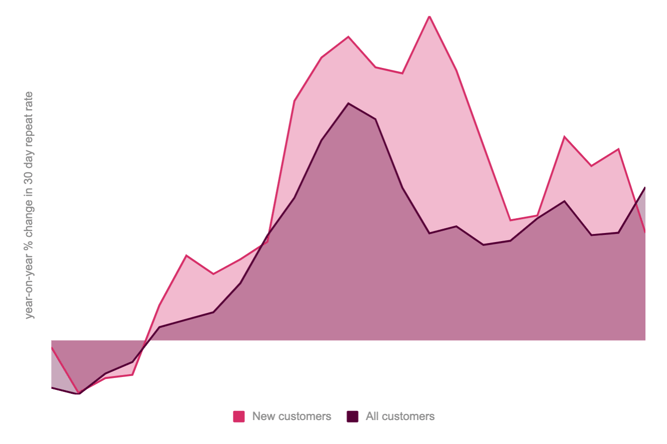Marketing in a post-Covid world: the Nest-Builders

In late March and early April, demand for the food and drink, health, and home and garden industries soared. Three months on, we explore how these brands continue to perform and adapt to changing consumer behaviour.
What is a Nest-Builder brand?
Nest-Builder brands supply products deemed essential by consumers: items like toilet roll, pasta, and, ahem, wine. These businesses boomed in sales at the start of lockdown before gradually declining (although remained up year-on-year).
You can find out more about Nest-Builders and discover your category in our guide to Marketing in a post-Covid world.
How lockdown impacted Nest-Builder brands
As consumers prepared for an indefinite length of time at home, they turned to Nest-Builder brands. Online orders for food and drink, health and wellness, and home and garden brands reached new highs as people looked to stock up from the safety of their sofa.
This included discovering niche providers, such as vegan meal kit delivery services or gin subscriptions, as mainstream supermarkets and other retailers struggled to meet demand. Overnight, Nest-Builder brands went from focussing on demand generation to how they could fulfil a huge influx in online orders.
Referrals also soared as people told loved ones about brands that could support them during this anxious time.
Order volumes & referrals for Nest-Builder brands

How Nest-Builder brands can sustain their sudden growth
The reopening of stores risks Nest-Builders’ growth stopping as suddenly as it started. To dissuade consumers from returning to old shopping habits, these brands should focus on customer retention strategies that nurture customers throughout their lifecycle.
Customers acquired during lockdown have different needs to the rest of the customer base. By understanding and responding to these needs, brands can turn these new shoppers into loyal brand advocates who return often and recommend them to others.
Examples
Let’s look at two fictional customers of an organic vegetable box delivery service.
Susie has had a weekly delivery since August last year. As a full-time working mum, she wants local, high-quality produce without taking time out of her busy schedule to go to the shops. This is unlikely to change as normal life resumes.
Meanwhile, pensioner Phil ordered his first veg box delivery in late March after being unable to leave the house or get an online supermarket delivery slot. He now takes occasional trips to the local supermarket and can get deliveries.
Phil is far more likely to return to old shopping habits and no longer buy from the veg box service. To avoid this, the company must show Phil why its offering is better than the mainstream supermarket. This could be by focussing on the quality of the produce; the ease (and safety) of the service; and being more than a simple service.
The latter is something recipe kit delivery brand Pasta Evangelists has tapped into. Its summer #ItalyAtHome campaign visits a different region of Italy - vicariously - with limited edition recipes, packaging, playlists, content and more.
Customer retention for Nest-Builder brands (YoY)
Added extras, like free delivery or competition entries, are another small yet powerful way to delight shoppers and encourage them to return.
The past few months have spurred significant growth for Nest-Builder brands. To sustain this into the future, adapting to customers' different circumstances and needs will be key.
For more insights into Nest-Builder brands and how you can sustain long-term growth for your business, check out our guide to Marketing in a post-Covid world.

Courtney Wylie
Courtney is VP of Product and Marketing for Mention Me. Helping leading eCommerce brands turbo charge their customer acquisition through fully flexible refer a friend programmes.
Read more >
Never miss another update
Subscribe to our blog and get monthly emails packed full of the latest marketing trends and tips








